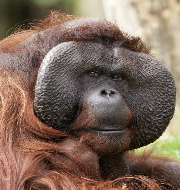IUCN declares Bornean orangutan critically endangered
Bornean orangutan, a primate species has been declared critically endangered by the International Union for Conservation of Nature and Natural Resources (IUCN).
The declaration was based on the assessment for the IUCN Red List of Threatened Species was carried out earlier.
IUCN assessment has found that population of Bornean orangutans has dropped by nearly two-third since the early 1970s. It has projected that their population will further decline to 47,000 animals by 2025 representing population loss of 86%.
About Bornean orangutan
- Bornean orangutan is a primate species native to the island of Borneo.
- Found only in the wild in Sumatra island (Indonesia) and Borneo in the Malaysian states of Sarawak and Sabah and Kalimantan.
- Together with the Sumatran orangutan, Bornean orangutan belongs to the only genus (Pongo) of great apes native to Asia.
- Orangutans share approximately 97% of their DNA with humans. They are highly intelligent and display advanced tool use and distinct cultural patterns in the wild.
Reasons for decline in Population
- Deforestation: It has dramatically shrunk habitat of Bornean orangutan. About 40% of Borneo’s forests lost since the early 1970s to plantation agriculture and it will continue.
- Hunting: In past four decades, about 2000 and 3,000 of Borneo’s orangutans were killed every year for their meat.
- Slow Breeding: They are slow breeders and produce only one offspring every six to eight years on average.
Month: Current Affairs - July, 2016


